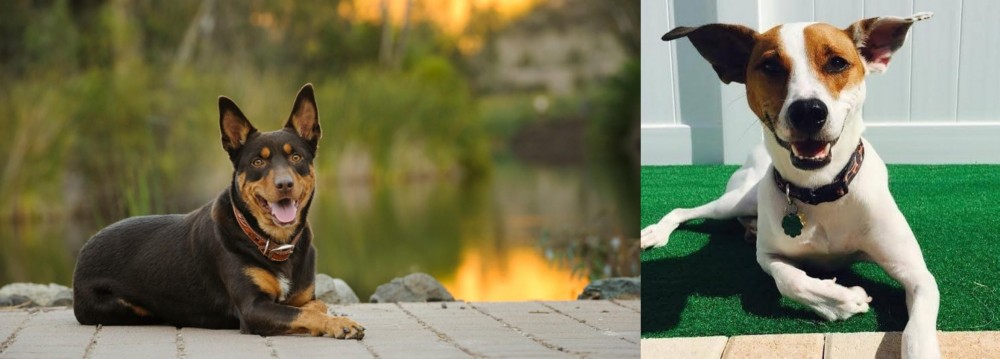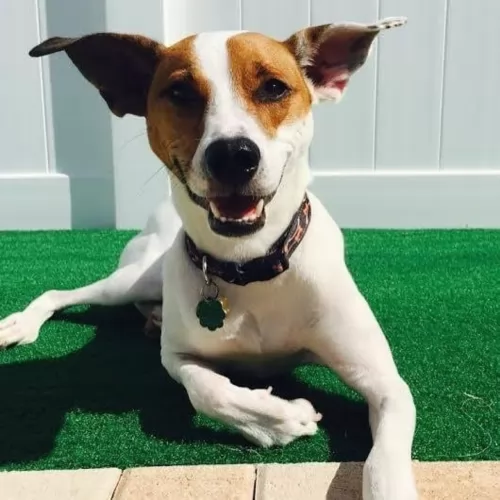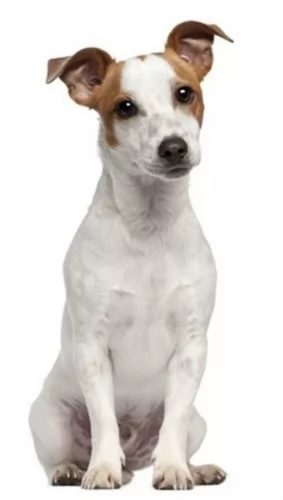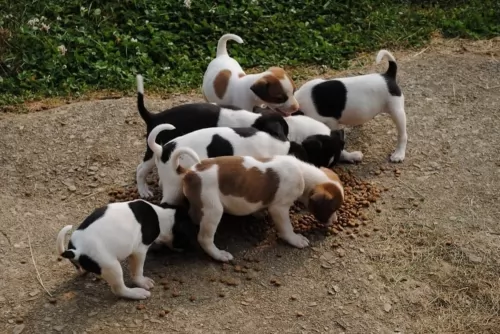 Petzlover
Petzlover Australian Kelpie is originated from Australia but Feist is originated from United States. Both Australian Kelpie and Feist are having almost same height. Both Australian Kelpie and Feist are having almost same weight. Australian Kelpie may live 3 years less than Feist. Australian Kelpie may have more litter size than Feist. Australian Kelpie requires Moderate Maintenance. But Feist requires Low Maintenance
Australian Kelpie is originated from Australia but Feist is originated from United States. Both Australian Kelpie and Feist are having almost same height. Both Australian Kelpie and Feist are having almost same weight. Australian Kelpie may live 3 years less than Feist. Australian Kelpie may have more litter size than Feist. Australian Kelpie requires Moderate Maintenance. But Feist requires Low Maintenance
 The energetic Kelpie came into being around 1870, with this working dog breed having a role to play with the herding of sheep in the harsh Australian outback.The sheep and wool industry in Australia has always been big business, and Australian ranchers were looking for a tough dog that could cope with sheep but also cope with the harsh environment.
The energetic Kelpie came into being around 1870, with this working dog breed having a role to play with the herding of sheep in the harsh Australian outback.The sheep and wool industry in Australia has always been big business, and Australian ranchers were looking for a tough dog that could cope with sheep but also cope with the harsh environment.
These are adaptable dogs too and their ancestors include the Coley or Collie, a British herding-type dog, the English- and the Australian Shepherd and the Dingo. In fact it is believed that up to 4% of their genes comes from the Dingo. These adaptable dogs were also brought to North America where they quickly adapted to the different climate and different livestock.
The Australian Kelpie isn’t your regular pet as they are essentially an outdoor, working dog. They are recognized today by the United Kennel Club and registered by the North American Australian Kelpie Registry.
 The Feist is a small dog from the United States, coming from Terrier dogs which were brought over to the States. It is believed that these Terriers included crosses between several terriers – the Manchester Terriers, Smooth Fox Terrier and English White Terrier – dogs used as ratters and known for their skills in killing rats.
The Feist is a small dog from the United States, coming from Terrier dogs which were brought over to the States. It is believed that these Terriers included crosses between several terriers – the Manchester Terriers, Smooth Fox Terrier and English White Terrier – dogs used as ratters and known for their skills in killing rats.
The Feist isn’t a new type of dog and in fact there are records of the dog which go back centuries. George Washington even referred to them in 1770 already, and the breed was popularized by President Teddy Roosevelt, who hunted with his Feist.
 The Kelpie is a medium-sized dog with a coat that comes in a number of colours – black, chocolate, fawn, red, blue, tan, white and gold. . The nose colour blends in with the dog’s coat colour and can be black, brownish and even pinkish.
The Kelpie is a medium-sized dog with a coat that comes in a number of colours – black, chocolate, fawn, red, blue, tan, white and gold. . The nose colour blends in with the dog’s coat colour and can be black, brownish and even pinkish.
The Kelpie has a medium-length tail which is low-set. The ears are pricked, giving the dog an intelligent, alert appearance. The dog’s head is also narrow and long, and his eyes are bright and inquisitive.
The Australian Kelpie has an athletic appearance, with a body which is longer than their height, similar to that of a German Shepherd. Because the Australian Kelpie is such an energetic, active breed, he’ll need plenty of ‘jobs to do’, lots of ball games and other exercise to keep him free from boredom and to ensure he maintains his lithe, lean, muscular limbs.
 Standing at about 46cm to 56cm in height and weighing in the region of 10 to 15kg, the Feist is a short haired dog that doesn’t shed much and he is not hypoallergenic.
Standing at about 46cm to 56cm in height and weighing in the region of 10 to 15kg, the Feist is a short haired dog that doesn’t shed much and he is not hypoallergenic.
The coat of the dog is available in a variety of colors but they are essentially a bi-colored dog such as red and white, tan and white, black and white, while solid colors are fawn, white, light brown, black and brindle too.
Perhaps because of so many genes being involved with this dog, it is more easily identified because of its hunting abilities. He is a sturdy dog with a medium length tail which he holds up. Some Feist owners prefer the look of a docked tail and then docking is between the second and third joint of the tail. The Feist has erect or semi-erect ears.
Intelligent and alert, the Feist is a dog that will respond well to training. As with any other dog, training and socialization will be important for him so that he is obedient. He is energetic, curious and alert and above all he wants the attention of his human family.
 The Australian Kelpie is an active, busy, intelligent, loving breed who is highly protective of his human family. He gets on well with children and other pets in the home but you’ll want him trained if you want him to be gentle around children and smaller pets. He does tend to gravitate towards one particular family member as his ‘favourite’ though.
The Australian Kelpie is an active, busy, intelligent, loving breed who is highly protective of his human family. He gets on well with children and other pets in the home but you’ll want him trained if you want him to be gentle around children and smaller pets. He does tend to gravitate towards one particular family member as his ‘favourite’ though.
Your Kelpie won't do well in an apartment as he is a working dog who wants plenty of place to run and play. If he is bored, it manifests itself with constant barking. Make sure to provide a stimulating, active lifestyle for your Australian Kelpie, provide him with everything a dog needs and you’ll be rewarded with a devoted and loyal companion.
 Loving to be around his human family and being a devoted and loyal canine friend, the Feist is also an intelligent, energetic dog who is fairly easy to train.
Loving to be around his human family and being a devoted and loyal canine friend, the Feist is also an intelligent, energetic dog who is fairly easy to train.
Bright and alert he makes a good watchdog too, but is amicable enough to get on well with other pets in the home as well as with children.
He can be stubborn so training and socialization will be important for him. As it is, he likes a firm, strong owner and in exchange for good care, he will become your devoted, loyal friend.
 Your Australian Kelpie is a hardy breed and you won’t find many health problems with him. Yes, every dog is susceptible to illnesses which are common with all dog breeds, and these are illnesses such as hip dysplasia and cryptorchidism.
Your Australian Kelpie is a hardy breed and you won’t find many health problems with him. Yes, every dog is susceptible to illnesses which are common with all dog breeds, and these are illnesses such as hip dysplasia and cryptorchidism.
You will need to check your Kelpie out for eye disease such as PRA or Progressive Retinal Atrophy, a group of genetic diseases which are found in some breeds of dogs. This can lead to cataracts and blindness.
Health problems in your Australian Kelpie can certainly be partially prevented by the way you feed your dog and by the environment you provide him with. Every dog has the potential to develop genetic health problems, but as we’ve said, the Kelpie is a generally healthy breed.
Always find a reputable breeder whose focus is on breeding healthy dogs and who can provide certification that the parents of the dog are clear of defects and are in tip-top condition for breeding.
Along with quality food and fresh water, getting your puppy vaccinated is hugely important. Australian Kelpie puppy shots will protect your new 4-legged family member from the likes of distemper, parvovirus and hepatitis. Your puppy will also need additional booster vaccinations after his first shots which start at around 8 weeks of age.
 A Feist is a robust dog who doesn’t have any particular health issues, and with good care he can reach 18 years of age if looked after well. Hip Dysplasia is such a common dog illness that it always bears mentioning.
A Feist is a robust dog who doesn’t have any particular health issues, and with good care he can reach 18 years of age if looked after well. Hip Dysplasia is such a common dog illness that it always bears mentioning.
This is a ball and socket joint problem where the joint doesn’t function smoothly and the grinding of the bone leads to pain and arthritis for your pet. You'll notice he battles to play games anymore and he also battles to get up after lying down. You need to know that this disease isn’t reserved for old dogs but can start while your dog is still a puppy and that it can lead to lameness.
Look out for allergies in your dog as they can cause a host of problems which can include his skin, his breathing and problems with digestion. Typical symptoms of a dog with allergies include sneezing,scratching and very distressing for a dog, itchy and red skin which can eventually ooze.
As a responsible dog owner it is imperative when you detect problems with your dog, to get him to the vet immediately.
 Australian Kelpies are low maintenance and their coat is easy to groom and maintain. You want to give him a good brush twice a week to get rid of loose hair. Australian Kelpies are moderate shedders.
Australian Kelpies are low maintenance and their coat is easy to groom and maintain. You want to give him a good brush twice a week to get rid of loose hair. Australian Kelpies are moderate shedders.
It is important to get your puppy off on the right foot to avoid health problems later on. Homemade dog food which includes chicken, rice and vegetables is always the best food for your dog. If you can't prepared your own meals for your Kelpie, top grade commercial dog food brands are recommended.
When looking at dog foods, remember that your Kelpie is a working dog – a naturally active breed and you’ll need to look at dog food which has been specially formulated for active dogs. Every dog will need raw meat in their diet if you want to avoid a dog with an itchy, flaky skin, a dog with poor energy levels and a dog that has no resistance to infection.
Every owner who cares for their dog will provide him with socialization and training. The Australian Kelpie is an intelligent breed who responds well to training.
 Grooming your Feist dog isn’t going to be costly or difficult at all, as with his short, smooth coat he will essentially only require a brush twice a week.
Grooming your Feist dog isn’t going to be costly or difficult at all, as with his short, smooth coat he will essentially only require a brush twice a week.
It’s good to get into the habit of brushing him as not only does it keep his coat sleek and shiny, he loves you paying him attention.
All dog owners need to know that grooming goes beyond just brushing the coat. You want to also check his nails that they are short, check in and around his ears and brush his teeth with special dog toothpaste and toothbrush.
Give your Feist the very best dog food there is. Home-made is always good but if you feed him commercially manufactured food, make sure its a quality one. Some raw meat added in every now and again is important for his health. Ensure fresh, cool water is available to him around the clock.
Your Feist is an energetic dog that has been accustomed to hunting and running down small prey. He is an outdoor dog, thriving on fun and games. Take him on your walks, your hikes or when you go cycling or swimming. He wants to be right there with you involved in everything. While he can slot into life in the city or the countryside, he isn’t an indoor dog and it certainly won’t be good for him if you keep him cooped up in a tiny garden and pretty much forget about him.